6
FS 130 /FS170
2.2 Basic operation and designated use of the machine
The machine has been built in accordance with state-of-the-art standards and the rec og nized safety
rules. Nevertheless, its use may constitute a risk to life and limb of the user or of third parties, or cause
damage to the machine and to other material property.
The machine must only be used in technically perfect condition in accordance with its des ig nat ed use
and the instructions set out in the operating manual, and only by safety-conscious persons who are fully
aware of the risks involved in operating the machine. Any functional disorders, especially those affecting
the safety of the machine, should therefore be rectifi ed immediately.
Separation building implements are exclusively designed for sawing, slotting, drilling a.s.o. of abrasive
building material at building sites using tools in ac cord ance with the manufacturer’s instruction.
They are exclusively designed for cutting fi rm built-in building material.
Using the machine for purposes other than those mentioned above (such as for) is considered contrary
to its des ig nat ed use. The manufacturer cannot be held liable for any damage resulting from such use.
The risk of such misuse lies en tire ly with the user. Operating the machine within the limits of its des ig -
nat ed use also involves observing the instructions set out in the operating man u al and complying with
the inspection and main te nance directives.
2.3 Organizational measures
The operating instructions must always be at hand at the place of use of the machine, e.g. by stowing
them in the tool compartment or tool-box pro vid ed for such purpose.
In addition to the operating instructions, observe and instruct the user in all oth er generally applicable
legal and other mandatory regulations relevant to accident prevention and en vi ron men tal protection.
These compulsory regulations may also deal with the handling of hazardous substances, issuing and/or
wearing of per son al protective equipment, or traffi c regulations.
The operating instructions must be supplemented by instructions covering the duties in volved in super-
vising and notifying special organizational features, such as job or gan i za tion, working sequences or the
personnel entrusted with the work.
Personnel entrusted with work on the machine must have read the operating instructions and in particular
the chapter on safety before beginning work. Read ing the instructions after work has begun is too late.
This applies especially to persons working only occasionally on the machine, e.g. during setting up or
maintenance.
Check - at least from time to time - whether the personnel is carrying out the work in com pli ance with the
operating instructions and paying attention to risks and safety factors.
For reasons of security, long hair must be tied back or otherwise secured, gar ments must be close-fi tting
and no jewellery - such as rings - may be worn. Injury may result from being caught up in the machinery
or from rings catching on moving parts.
Use protective equipment wherever required by the circumstances or by law.
Observe all safety instructions and warnings attached to the machine.
See to it that safety instructions and warnings attached to the machine are al ways complete and perfectly
legible.
In the event of safety-relevant modifi cations or changes in the behaviour of the machine during operation,
stop the machine immediately and report the mal func tion to the competent authority/person.
Never make any modifi cations, additions or conversions which might affect safe ty without the supplier’s
approval. This also applies to the installation and ad just ment of safety devices and valves as well as to
welding work on load-bearing elements.
Spare parts must comply with the technical requirements specifi ed by the man u fac tur er. Spare parts from
original equipment manufacturers can be relied to do so.
Replace hydraulic hoses within stipulated and appropriate intervals even if no safety-relevant defects
have been detected.
Adhere to prescribed intervals or those specifi ed in the operating instructions for routine checks and
inspections!

